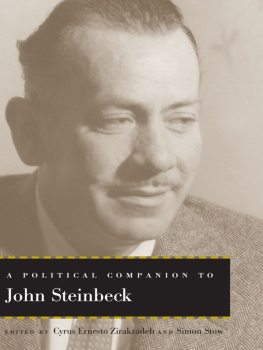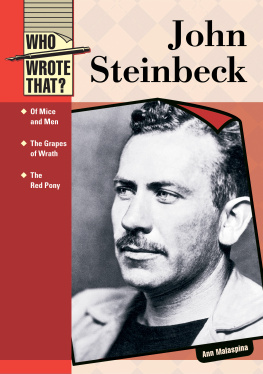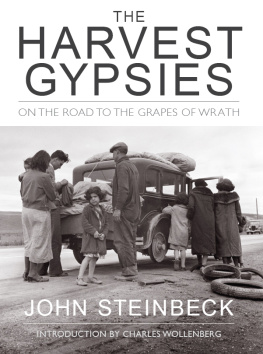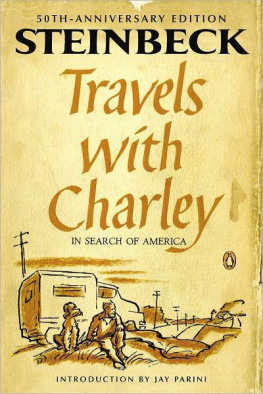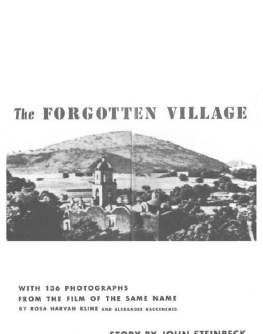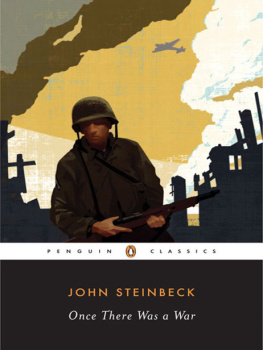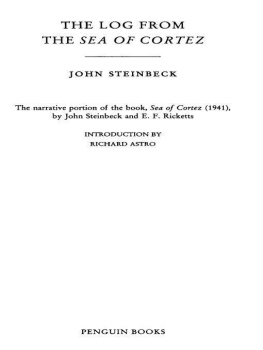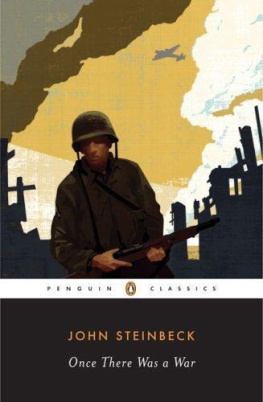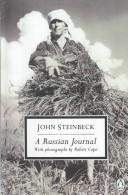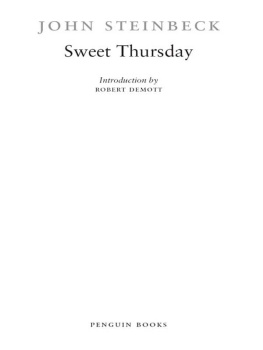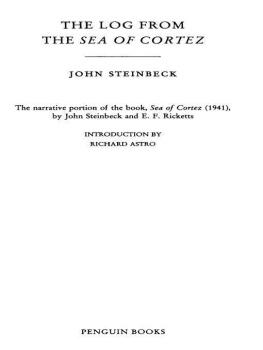A Political Companion to
John Steinbeck
A POLITICAL COMPANION TO
John Steinbeck
Edited by
Cyrus Ernesto Zirakzadeh
and Simon Stow
Copyright 2013 by The University Press of Kentucky
Scholarly publisher for the Commonwealth, serving Bellarmine University, Berea College, Centre College of Kentucky, Eastern Kentucky University, The Filson Historical Society, Georgetown College, Kentucky Historical Society, Kentucky State University, Morehead State University, Murray State University, Northern Kentucky University, Transylvania University, University of Kentucky, University of Louisville, and Western Kentucky University.
All rights reserved.
Editorial and Sales Offices : The University Press of Kentucky 663 South Limestone Street, Lexington, Kentucky 40508-4008
www.kentuckypress.com
17 16 15 14 13 5 4 3 2 1
Library of Congress Cataloging-in-Publication Data
A political companion to John Steinbeck / edited by Cyrus Ernesto Zirakzadeh and Simon Stow.
pages cm. (Political companions to great American authors)
Includes bibliographical references and index.
ISBN 978-0-8131-4202-9 (hardcover : alk. paper)
ISBN 978-0-8131-4203-6 (epub) ISBN 978-0-8131-4204-3 (pdf)
1. Steinbeck, John, 1902-1968Political and social views. 2. Politics and literatureUnited StatesHistory20th century. I. Zirakzadeh, Cyrus Ernesto, 1951 editor of compilation II. Stow, Simon, editor of compilation
PS3537.T3234Z787 2013
959.7043373--dc23
2013003757
This book is printed on acid-free paper meeting the requirements of the American National Standard for Permanence in Paper for Printed Library Materials.
Manufactured in the United States of America.
I believe that out of the whole body of our past, out of our differences, our quarrels, our many interests and directions, something has emerged that is itself unique in the world: Americacomplicated, paradoxical, bullheaded, shy, cruel, boisterous, unspeakably dear, and very beautiful.
John Steinbeck, America and Americans
I did not need or want to be a citizen of this gray and dangerous country.
John Steinbeck, The Winter of Our Discontent
Contents
Patrick J. Deneen
Rick Wartzman
Simon Stow
Cyrus Ernesto Zirakzadeh
Zoe Trodd
Donna Kornhaber
Adrienne Akins Warfield
Charles Williams
Michael T. Gibbons
Roxanne Harde
James R. Swensen
Marijane Osborn
Lauren Onkey
Cyrus Ernesto Zirakzadeh
Mimi R. Gladstein and James H. Meredith
Robert S. Hughes
Simon Stow
Series Foreword
THOSE WHO UNDERTAKE a study of American political thought must attend to the great theorists, philosophers, and essayists. Such a study is incomplete, however, if it neglects American literature, one of the greatest repositories of the nations political thought and teachings.
Americas literature is distinctive because it is, above all, intended for a democratic citizenry. In contrast to eras when an author would aim to inform or influence a select aristocratic audience, in democratic times public influence and education must resonate with a more expansive, less leisured, and diverse audience to be effective. The great works of Americas literary tradition are the natural locus of democratic political teaching. Invoking the interest and attention of citizens through the pleasures afforded by the literary form, many of Americas great thinkers sought to forge a democratic public philosophy with subtle and often challenging teachings that unfolded in narrative, plot, and character development. Perhaps more than any other nations literary tradition, American literature is ineluctably politicalshaped by democracy as much as it has in turn shaped democracy.
The Political Companions to Great American Authors series highlights the teachings of the great authors in Americas literary and belletristic tradition. An astute political interpretation of Americas literary tradition requires careful, patient, and attentive readers who approach a text with a view to understanding its underlying messages about citizenship and democracy. Essayists in this series approach the classic texts not with a hermeneutics of suspicion but with the curiosity of fellow citizens who believe that the great authors have something of value to teach their readers. The series brings together essays from varied approaches and viewpoints for the common purpose of elucidating the political teachings of the nations greatest authors for those seeking a better understanding of American democracy.
Patrick J. Deneen
Series Editor
PROLOGUE
John Steinbeck in the 1930s: Living Under the Gun
Rick Wartzman
IN ONE OF HIS MORE obscure works, The Acts of King Arthur and His Noble Knights , John Steinbeck asserts that in any fight the final weapon is the brain. All else is supplemental. Perhaps. This analysis, however, didnt stop Steinbeck from packing a pistol in the late 1930s, just in case he needed a little protection beyond what resided between his ears.
It isnt entirely clear what kind of firearm he had. But records suggest that he owned a Colt automatic, maybe two. In any case, beyond doubt is that Steinbeck felt his life was in dangeras stark a sign as any of the deep divide between Far Left and Far Right in California during the Great Depression and of the central role that Steinbeck played in this schism.
As one account has it, Steinbeck was attending a picnic with some old friends from Salinas High during those hungry years when a white pickup truck jumped the curb and sent everyone scattering. Two men leaped out, and one thrust a gun into Steinbecks chest. The assailant told Steinbeck that he better stop writing what he was writingor else, one of the picnic goers would recall much later.
Over time, Steinbeck grew afraid that he might be set up for charges of drunk driving or falsely accused of rape. I went to my attorney, and he said there was no way of stopping a charge but advised me of keeping a diary containing names of people I saw and when so that I could call an alibi if I had to, Steinbeck explained, adding that his enemies were capable of anything.
A few years later, after Steinbeck had moved to the East Coast, the menacing evidently continued. According to one story, he took a phone call
It is difficult to think of another authoraside perhaps from Salman Rushdie, on whose head a fatwa would be placed a half century after Steinbecks struggleswho has come under siege like this. And it certainly raises the question, Why would anyone want Steinbeck dead?
The short answer, of course, boils down to four words: The Grapes of Wrath . Steinbecks 1939 classic, more than any book of its day, laid bare the inequities of capitalism and the mistreatment of migrant laborers who toiled in Californias farm fields. But it did so in a style that, for many readers, was more compelling and accessible than the proletarian literature of Dos Passos, Farrell, or Caldwell. The result: The Grapes of Wrath catapulted to the top of the national best-seller list in 1939 (with some 430,000 copies sold), and it was also one of Americas top-ten favorites for 1940, when the film version of the novel appeared.




